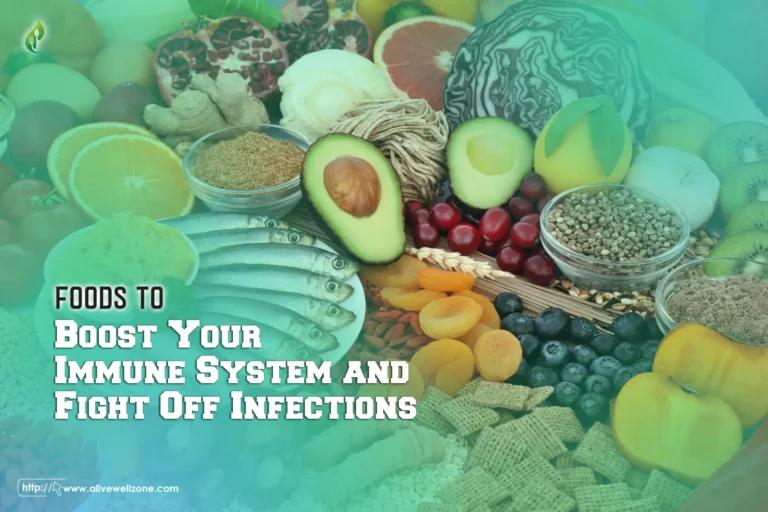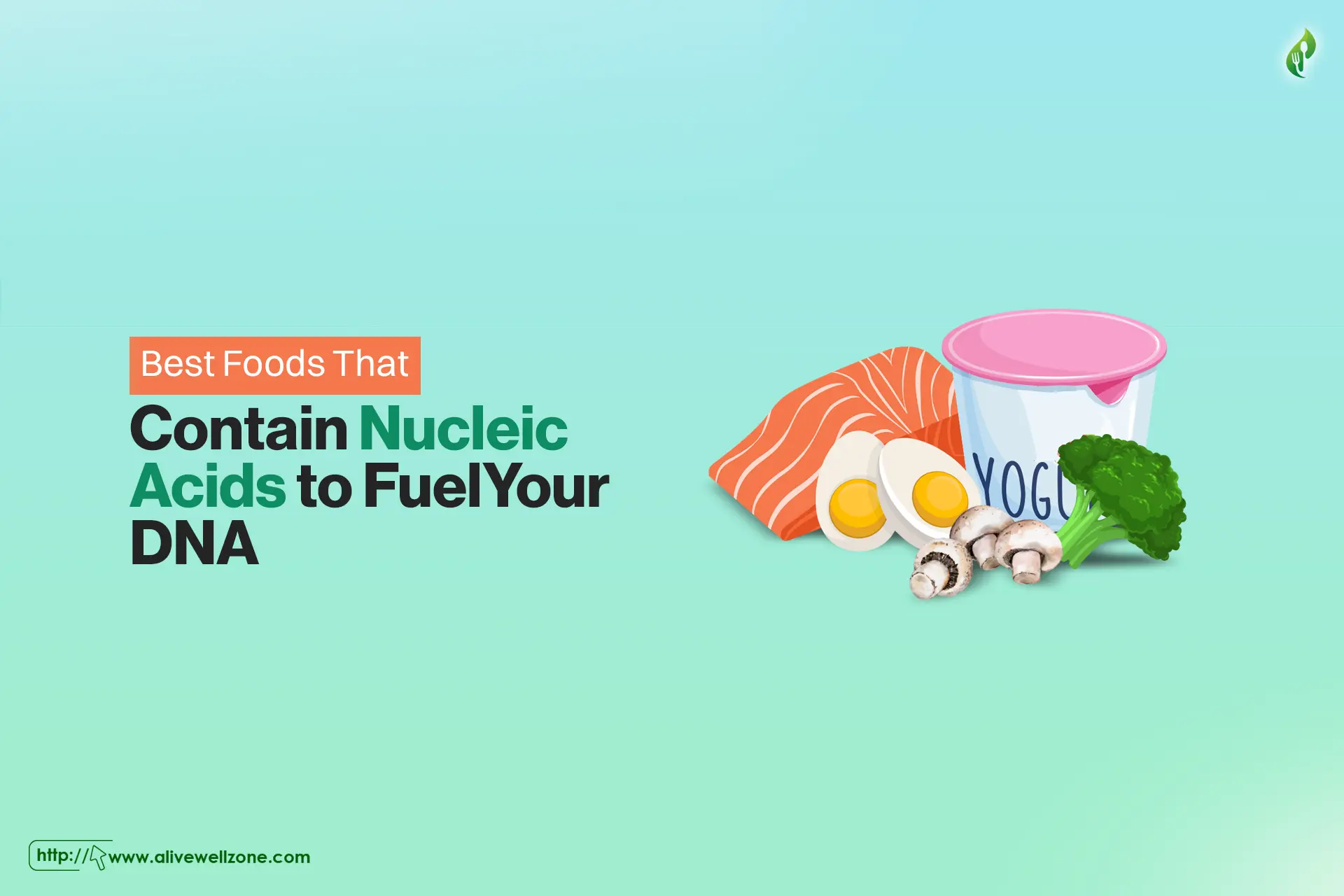
Last Updated on November 8, 2024 by Helena Akter
Ever wondered what makes your body tick? We often think about proteins, vitamins, and minerals! However, there’s another vital thing that’s often forgotten: nucleic acids. These tiny molecules are the blueprints for life, found in DNA and RNA.
But, can you get them through food?
Yes, you can. Foods that contain nucleic acids are meat, salmon, eggs, seafood, yogurt, broccoli, lentils, mussels, and mushrooms. They support your vital cellular functions like DNA replication, growth, and repair.
To further explain, we’ll go over nucleic acid’s role in your body. We’ll also share the major reasons why you need this acid. Finally, we’ll share some of its health benefits as well.
Key Takeaways
- Nucleic Acids: They’re important for cells to work. They help store and send genetic information, and they help cells grow, heal, and use energy. DNA is like a blueprint, and RNA turns this information into proteins.
- Dietary Source: You can get nucleic acids from foods like salmon, meat, seafood, eggs, yogurt, lentils, broccoli, mushrooms, and mussels. Eating these foods can help your body’s cells work better and stay healthy.
- Health Benefits: Eating nucleic acids might help your immune system, reduce stress, help muscles heal, and improve digestion. That’s especially true when your body is stressed or needs more.
- Protein and Nucleic Acid Connection: Proteins are made from amino acids and help build and repair tissues. Nucleic acids and proteins are connected, so you must eat a balanced diet with enough of both to stay healthy.
Role of Nucleic Acids in the Human Body
Nucleic acids are important molecules found in all viruses and cells. They help store and use genetic information.
- DNA is like a blueprint. It tells our cells how to make proteins and other important things.
- RNA is the messenger. It takes the information from DNA and turns it into proteins. This is how cells work correctly and help the body do its job.
Nucleic acids are also important for cell division. They make sure that genetic information is copied correctly when cells divide. It helps repair cellular growth, and the metabolism of energy.
Top 11 Foods That Have Nucleic Acids to Boost Your Cellular Health
Nucleic acids help your body’s cells work, grow, and heal. You might not think about them that much. However, these important molecules are in many foods we eat every day.
So, here are the foods that contain nucleic acids —
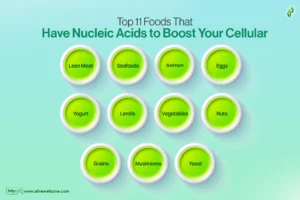
1. Lean Meat
Meat is a good source of nucleic acids, with 1.5 to 8 grams per 3.5 ounces. In addition, meat provides protein, zinc, iron, and vitamin B12.
However, you must eat it in moderation because too much red or processed meat can be bad for your health.
While meat is a rich source of nucleic acids, more recent studies are needed to confirm this. And diets high in processed or red meats have been linked to an increased risk of stroke, heart disease, and diabetes.
So, the American Heart Association (AHA) suggests choosing fish, unprocessed meats, lean, or plant-based proteins whenever possible.
2. Seafoods
Seafood is divided into two main groups: crustaceans and mollusks. While it has less nucleic acid than meat or fish, seafood is still very nutritious.
These include crustaceans like shrimp, crab, lobster, and crayfish as well as mollusks like clams, oysters, and scallops. Among seafood, mussels excel for their high amount of nucleic acids.
Mussels
Mussels are a delicious and nutritious type of shellfish. They’re packed with protein, essential vitamins, and minerals. Also, Mussels are a great source of omega-3 fatty acids, which are good for your heart.
Besides, mussels are a complete protein source, meaning they contain all the amino acids your body needs. Plus, Mussels are rich in nucleic acids. Nucleic acids are important for cell growth and repair. They help your body store and transmit genetic information.
Moreover, they’re a sustainable and affordable seafood option.
Older studies show that 3.5 ounces of seafood can have between 0.5 and 1.5 grams of nucleic acids. Seafood is also a good source of lean protein, zinc, omega-3 fatty acids, iron, and vitamin B12.
However, some seafood may contain heavy metals like cadmium and mercury.
The FDA says that young children and nursing or pregnant people should choose seafood with low mercury levels, like clams, shrimp, oysters, squid, crab, and lobster.

3. Salmon
Salmon is a healthy food that is good for you. It has a lot of nutrients, including nucleic acids, which are important for your body.
In fact, a 3.5-ounce serving of salmon has a lot of essential amino acids, which are good for your muscles and bones. Salmon is also one of the top heart-healthy foods that can benefit your cardiovascular system.
Plus, Salmon has long-chain omega-3 fatty acids. They’re good for your heart and brain. Whether you choose wild or farmed salmon, you’ll get a healthy food that helps you stay healthy.
Eating salmon regularly can help you have a balanced and healthy diet. So, you can follow our healthy salmon recipes you can make every day.
4. Eggs
Eggs are a great source of protein and other nutrients. The white part is especially high in protein and has a perfect amino acid profile.
But did you know that eggs are also rich in nucleic acids? These are essential building blocks for DNA. Thus, eggs become a staple in any list of healthy eating habits you should know
Both the white and yolk parts of eggs contain a lot of nucleic acids, which help cells replicate their DNA. Also, eggs are packed with antioxidants like lutein and choline.
5. Yogurt
Yogurt is a great source of nucleic acids, especially inosine monophosphate (IMP). It’s also packed with vitamins and minerals, like calcium and phosphorus. This makes it good for your spleen and your health in general.
Now, opt for organic plain yogurt to get more probiotics and live cultures that help your gut. Plus, studies show that eating yogurt regularly can improve your gut health and reduce the risk of colon cancer.
Besides, yogurt is incredibly versatile!
You can use it for sweet treats like pies, smoothies, and cakes, or savory dishes like spreads, sauces, dips, salad dressings, marinades, and even vegan cream cheese.
The possibilities are endless!
6. Lentils
Lentils are a type of bean that’s packed with nutrients and a little nucleic acid. They’re a good source of protein, fiber, and carbohydrates. Plus, they contain minerals like zinc, potassium, manganese, copper, and phosphorus.
In fact, just half a cup of cooked lentils has around 162 calories, 8.22 grams of protein, and 18.36 grams of carbs. Plus, the fiber in lentils helps your digestive system stay healthy.
Lentils are super versatile like yogurt. You can use them in many dishes like salads, soups, and stews. They’re a great choice for anyone looking for a healthy and balanced diet.
7. Vegetables
Broccoli is a very nutritious vegetable. It has many vitamins, like C, K, and folate, and minerals like potassium and calcium. Also, it has fiber and nucleic acids, which help cells stay healthy.
Plus, it helps you grow, heal, and stay healthy. So, eating broccoli is a good way to improve your overall health.
Moreover, other vegetables have nucleic acids and are good for you —
- Spinach: It’s known for its iron. It also has nucleic acids, and vitamins A, C, and K. These vitamins are good for your immune system, skin, and bones.
- Asparagus: This one is high in folate, fiber, and antioxidants. It helps with digestion and cellular health. It also supports DNA repair, thanks to its small nucleic content.
- Cauliflower: It’s similar to broccoli which falls into the cruciferous group. It has nucleic acids and is rich in fiber and detoxifying compounds.
- Lettuce: It’s simple, but it has vitamin A, folate, and a small amount of nucleic acids. This makes it a light and hydrating addition to meals for proper cell function.
8. Nuts
Nuts aren’t just tasty snacks; they’re also packed with nutrients that are good for you. While they don’t have as much nucleic acid as seafood or meat, they still help your body work well.
In fact, nucleic acids in nuts help your cells grow and function. When you eat them, they break down into smaller parts called nucleotides. Your body uses these parts for energy and other important things.
Here are some nuts that are high in nucleic acids —
- Almonds: These nuts have healthy protein, fats, and fiber, and they also have a little bit of nucleic acid.
- Walnuts: Walnuts are known for their omega-3 fats, which are good for your brain. They also have nucleic acids that can help reduce inflammation.
- Cashews: These nuts are full of healthy protein, fats, and nucleic acids, which can help your immune system and overall health.
- Pistachios: Pistachios have healthy fats, protein, and nucleic acids. They can help your heart and blood sugar stay healthy.
9. Grains
Grains are made up of tiny building blocks called DNA and RNA, which are found in all living things. These building blocks help development and growth, and genetic coding.
Now, when we eat grains, our bodies break down these building blocks into smaller parts called nucleotides. Our bodies use these smaller parts to do different metabolic things.
Here are some grains and what they have —
- Wheat: It has DNA and RNA. We use it to make pasta, bread, and other foods.
- Rice: It also has DNA and RNA. Many people eat it all over the world.
- Corn: It has DNA and RNA. We use it to make syrup and cornmeal.
- Oats: They have DNA and RNA too. We often use them in granola and oatmeal.
These grains are good for us because they give us carbohydrate and other important nutrients that our bodies need.
10. Mushrooms
Most vegetables are low in nucleic acids, but mushrooms might be the exception. Studies show that mushrooms can provide a significant amount of these essential nutrients.
As pointed out by the U.S. National Library of Medicine many kinds of mushrooms, like button, cep, whitecap, and oyster mushrooms, are especially high in nucleic acids.
In fact, just 3.5 ounces of mushrooms can contain 0.5 to 1.5 gm of nucleic acid which is equal to beans or seafood.
If you eat mushrooms regularly, you’re getting not only nucleic acids but also B vitamins, copper, fiber, and antioxidants. These nutrients can help you stay healthy and fight diseases.
Eating mushrooms regularly can help your digestion, lower your cholesterol, and improve your gut health. So, add them to your meals to enjoy these benefits.
11. Yeast
Yeast is a kind of fungus that has both DNA and RNA, just like other living things. DNA tells yeast how to grow, reproduce, and use energy. RNA helps make proteins and do other important things inside cells.
Besides, yeast is often used in baking and brewing. It’s also a good source of B vitamins and protein.
Why Do Humans Need Nucleic Acids?
Nucleic acids are very important for our bodies. They help with almost every function our bodies do. They’re made of smaller parts called nucleotides. Plus, they carry our genes and give our cells the energy they need.
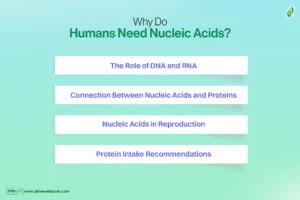
The Role of DNA and RNA
Most people know about DNA. It’s like a blueprint that tells our bodies how to make proteins and other things we need to develop, grow and stay healthy. DNA is in the nucleus or middle of our cells.
RNA is different. It takes the information from DNA and turns it into proteins. This makes sure our bodies work the way they should.
Connection Between Nucleic Acids and Proteins
Nucleic acids and proteins are connected. Proteins are made from amino acids and help build and fix our bodies. Fun fact, the same amino acids that make proteins also help make DNA.
So, eating different foods with lots of protein is important for staying healthy. These foods give us vital amino acids that our bodies can’t make alone.
Nucleic Acids in Reproduction
Nucleic acids are also important for having babies. They pass genes from parents to their children. When a sperm meets an egg, its DNA joins together to make a fertilized egg. This egg has all the genes needed to become a person.
Protein Intake Recommendations
The Institute of Medicine suggests at least 0.8 grams of protein each kilogram. So, if you weight 165 pounds, you’d need about 60 grams of protein daily.
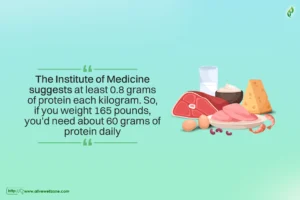
However, many experts think you might need more. A highly cited review in Food & Function from March 2016 suggests these guidelines —
- Minimal activity: 1 gram per 2.2 pounds of body weight
- Intense activity: 1.6 grams per 2.2 pounds of body weight
- Moderate activity: 1.3 grams per 2.2 pounds of body weight
What are the Benefits of Nucleic Acids?
Some foods that contain nucleic acids are believed to be good for your health. While scientists don’t have a lot of evidence to support this, some say these foods can help your immune system and digestion.
Well, your body can produce these essential compounds on its own. However, certain situations—such as injury, illness, or growth spurts—might increase your need for them.
In such cases, consuming foods rich in nucleic acids can provide additional support. So, here are some potential benefits of nucleic acids —
- Improved immune response
- Lower oxidative stress
- Faster muscle recovery
- Improved digestion
- Better metabolic regulation
Final Words
So, what have we learned? Nucleic acids are essential building blocks for our bodies. They play a vital role in everything from cell growth to DNA replication.
While our bodies can produce them, consuming foods rich in nucleic acids can provide extra support. And it’s especially during times of stress or growth.
From salmon to lentils, there’s a variety of delicious foods that contain nucleic acids. So, next time you’re planning your meals, consider incorporating more nucleic acid-rich foods into your diet.
Your body will thank you!
FAQs
Where are nucleic acids found?
Nucleic acids are found in all living things, including plants, animals, and even viruses. Their first discovery was in the nucleus of eukaryotic cells, but they are found in all parts of living organisms.
Does milk have nucleic acids?
Milk has nucleic acids. In healthy cows, there are about 273 micrograms of nucleic acids in every 100 milliliters of milk. It’s a small amount, but it shows that these acids are found in both milk and blood.
Why would you not test for nucleic acids in food?
It’s hard to test food for nucleic acids because they are fragile and break down easily in the stomach. The acid and enzymes in the stomach make it hard to find and identify these molecules after they’ve been digested.
Do humans need to eat nucleic acids?
No, humans don’t need to get nucleic acids from their food. But they can be helpful after surgery, injury, or when the immune system is weak. These acids can help the body make more healthy cells and support the intestines.


